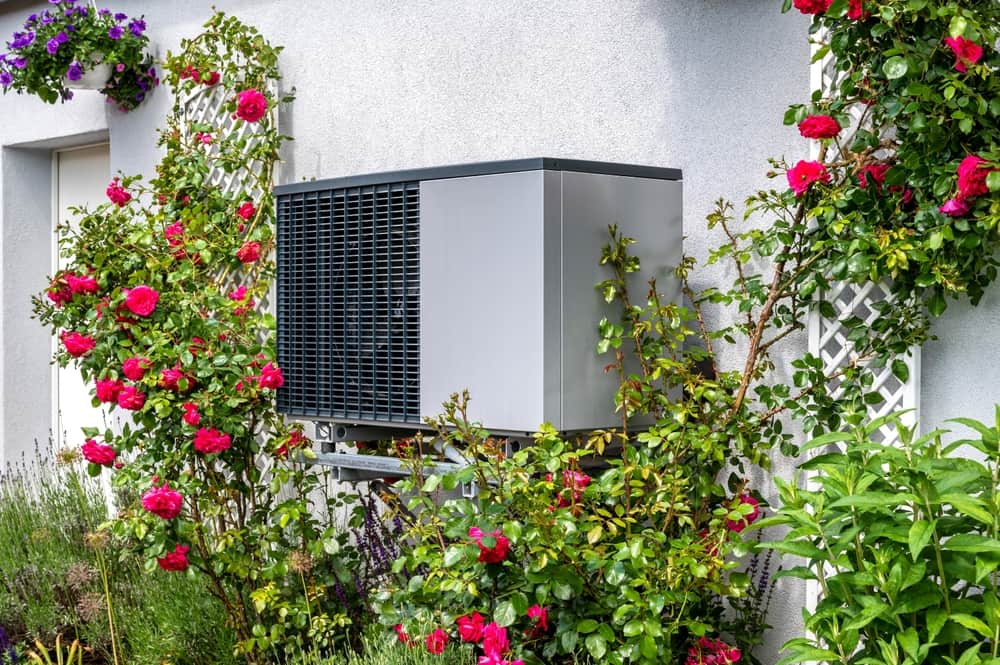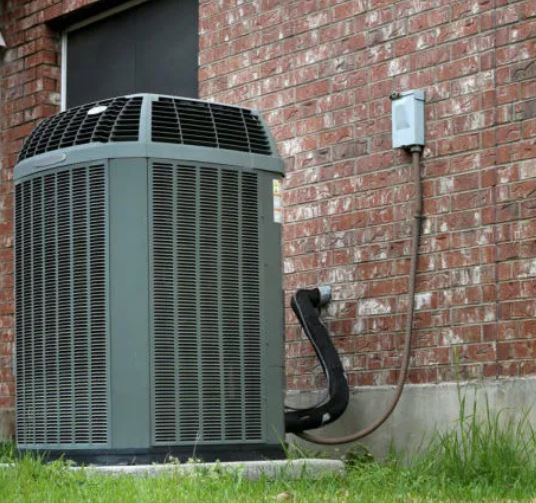To calculate tonnage for HVAC, use the formula: Total BTUs needed / 12,000. In other words, divide the total BTUs required by 12,000 to determine the necessary tonnage for the HVAC system. How to Calculate Tonnage for HVAC
Calculating the tonnage for HVAC is an essential step in determining the appropriate size of the system for a particular space. By understanding the tonnage required, you can ensure that the HVAC system efficiently and effectively cools or heats the area.
We will explore the process of calculating tonnage for HVAC, providing you with a clear understanding of how to determine the appropriate size for your system. It is important to note that this calculation is a rough estimation and professional guidance may be necessary for a more accurate assessment.

Credit : www.aireserv.com
Hvac Tonnage Calculation Essentials
Looking to calculate tonnage for your HVAC system? Learn the essentials of HVAC tonnage calculation and how to determine the right size AC system for your home or commercial space. Avoid overused phrases and get accurate results with these expert tips.
Importance Of Correct Hvac Sizing
Proper HVAC sizing is crucial for the efficiency and performance of a system. Incorrect sizing can lead to inadequate heating or cooling capacity, resulting in discomfort for occupants and higher energy bills. Oversized units can short-cycle, frequent starts and stops, causing excessive wear and tear on the system. Undersized units, on the other hand, may struggle to maintain the desired temperature, leading to longer runtimes and increased energy consumption.
Introduction To Tonnage In Hvac Systems
In HVAC systems, tonnage refers to the cooling or heating capacity of the system. It measures the amount of heat a system can remove or add to a space in an hour. HVAC tonnage is determined by the British Thermal Units (BTUs) required to cool or heat a particular area.
Calculation of HVAC tonnage involves considering several factors, including the size of the area to be conditioned, the climate of the location, the efficiency of the HVAC system, and the level of insulation in the building. By accurately calculating the required tonnage, HVAC professionals can ensure that the system operates efficiently, providing optimal comfort while minimizing energy consumption.
Ensuring Accurate Hvac Tonnage Calculation
To calculate tonnage for HVAC, several steps need to be followed:
- Determine the square footage of the area to be conditioned.
- Consider the climate zone in which the building is located.
- Take into account the level of insulation in the building.
- Calculate the cooling or heating load using accepted industry standards.
- Select the appropriate HVAC system with the matching tonnage.
It’s important to note that HVAC tonnage calculation is a complex process that requires expertise and knowledge of HVAC engineering principles. Consulting with a professional HVAC contractor is recommended to ensure accurate sizing and proper selection of the HVAC system.
Understanding Btu And Hvac Tonnage
Understanding BTU and HVAC tonnage is crucial when calculating the tonnage required for HVAC systems. By considering the British Thermal Units (BTU) and the tonnage of the system, you can accurately determine the size and capacity needed for efficient heating and cooling.
When it comes to determining the right size HVAC system for your space, understanding the relationship between British Thermal Units (BTUs) and HVAC tonnage is crucial. BTUs measure the amount of heat that an HVAC system can add or remove from a space. On the other hand, HVAC tonnage refers to the cooling capacity of an air conditioning system.
Relationship Between Btus And Tonnage
The relationship between BTUs and tonnage is quite straightforward. One ton of cooling is equivalent to 12,000 BTUs per hour. So, if you have a system that is rated at 24,000 BTUs per hour, it would be considered a 2-ton cooling capacity. Similarly, a system rated at 36,000 BTUs per hour would be a 3-ton unit. Knowing this relationship allows you to determine the tonnage of your HVAC system based on its BTU rating.
Why Tonnage Is Crucial For Efficiency
Ensuring that your HVAC system is properly sized is crucial for efficiency and optimal performance. If your system is too small, it will struggle to cool or heat your space adequately. On the other hand, if your system is oversized, it will cycle on and off frequently, leading to increased energy consumption, shorter equipment lifespan, and poor indoor air quality.
By accurately calculating the tonnage required for your space, you can ensure that your HVAC system operates efficiently, providing the right amount of cooling or heating without unnecessary energy waste.
Expert Guide On How To Calculate Tonnage For Hvac
Expert Guide on How to Calculate Tonnage for HVAC
If you’re in the HVAC industry or a homeowner looking to install a new HVAC system, understanding how to calculate tonnage for HVAC is essential. The tonnage of an HVAC system refers to its cooling capacity, which is measured in tons. Determining the right tonnage for your HVAC system is crucial to ensure efficient cooling and optimal performance.
Factors Influencing Hvac System Tonnage Needs
Calculating the tonnage for an HVAC system involves considering several factors that influence the cooling load of a space. These factors include:
- Size of the area: The size of the space being cooled plays a significant role in determining tonnage requirements. Larger spaces typically require higher tonnage.
- Insulation: The level of insulation in the walls, ceiling, and floors affects the cooling load. Well-insulated spaces may require lower tonnage.
- Geographical location: The climate of the region where the HVAC system will be installed impacts tonnage needs. Hotter climates require higher tonnage for efficient cooling.
- Windows and doors: The number, size, and quality of windows and doors in the space affect the cooling load. Spaces with many windows and poorly insulated doors may require higher tonnage.
- Occupancy and usage: The number of people occupying the space and the activities performed contribute to the overall cooling load. High occupancy or usage can increase tonnage needs.
Step-by-step Tonnage Calculation Process
Calculating the tonnage for an HVAC system follows a step-by-step process. By following these steps, you can determine the appropriate tonnage for your specific needs:
- Measure the square footage of the space: Begin by measuring the length and width of the area to be cooled. Multiply these two measurements to get the square footage.
- Determine the cooling load: Use industry-standard cooling load calculations or consult an HVAC professional to determine the cooling load required for the space.
- Consider the factors influencing tonnage needs: Take into account the factors mentioned earlier, such as insulation, geographical location, windows and doors, and occupancy, to adjust the cooling load accordingly.
- Refer to tonnage guidelines: HVAC manufacturers typically provide tonnage guidelines based on square footage or cooling load. These guidelines can serve as a starting point for determining the appropriate tonnage.
- Consult an HVAC professional: For accurate tonnage calculation and system sizing, it’s always advisable to consult an HVAC professional who can assess your specific needs and recommend the right tonnage for your HVAC system.
By following this step-by-step tonnage calculation process, you can ensure that your HVAC system is appropriately sized to provide efficient cooling for your space.

Credit: bakerhomeenergy.com
Tools And Resources For Accurate Calculations
When it comes to calculating tonnage for HVAC systems, having the right tools and resources is crucial. Accurate calculations ensure that the system is properly sized for the space it will be cooling or heating, resulting in optimal performance and energy efficiency. In this section, we will explore some of the essential tools and resources that HVAC professionals can utilize when calculating tonnage for HVAC systems.
Software And Calculators For Hvac Professionals
There are various software and calculators available that are specifically designed to assist HVAC professionals in accurately calculating tonnage for HVAC systems. These tools streamline the calculation process, reducing the margin of error and saving valuable time. Here are some popular software and calculators used by HVAC professionals:
- BTU and Tonnage Calculator for Air Conditioners – This calculator, offered by Kobie Complete, allows HVAC professionals to input data such as room size, insulation variables, and heating guide to determine the appropriate tonnage for an air conditioning system.
- AC Size Calculator – AC Direct offers a free and easy-to-use calculator that helps determine the BTUs and tonnage needed for an air conditioning system. It takes into account factors like the size of the space, insulation, and other variables to provide accurate results.
These software and calculators leverage advanced algorithms and formulas to generate precise tonnage calculations, taking into consideration various factors such as room dimensions, insulation, and heat load. By using these tools, HVAC professionals can ensure that the tonnage calculation for a given system is accurate and reliable.
Manuals And Manufacturer Specifications As Resources
In addition to software and calculators, HVAC professionals can also rely on manuals and manufacturer specifications as valuable resources when calculating tonnage for HVAC systems. Manufacturers provide detailed information about their products, including the recommended tonnage for different-sized spaces and specific models.
By referring to these resources, HVAC professionals can obtain the necessary data to make precise calculations. Manuals often contain sizing charts and tables that help determine the appropriate tonnage based on factors like square footage, insulation levels, and geographical location.
Additionally, manufacturer specifications provide insights into the system’s performance capabilities, refrigerant type, and energy efficiency rating. This information is vital for accurate tonnage calculations, as it ensures that the system is not under or over-sized.
Overall, manuals and manufacturer specifications serve as reliable and trustworthy resources for HVAC professionals, empowering them to make precise tonnage calculations for HVAC systems.
Real-world Application Of Tonnage Calculations
Calculating tonnage for HVAC systems is essential for ensuring optimal performance and comfort in both residential and commercial settings. By determining the correct tonnage, you can avoid under or over-sizing the system, leading to energy wastage or insufficient heating and cooling capacity. In this section, we will explore real-world case studies of tonnage calculations in residential and commercial scenarios. We will also discuss the importance of adjusting calculations for climate variations. Let’s dive in!
Case Studies: Residential And Commercial Scenarios
To fully understand the practical application of tonnage calculations, let’s explore two case studies – one in a residential setting and another in a commercial environment.
Residential Case Study:
In a residential scenario, consider a two-story house with a total area of 2,500 square feet located in a moderate climate zone. To calculate the required tonnage for this home, we will need to consider several factors:
- Size of the rooms: Measure the dimensions of each room and calculate their total square footage.
- Insulation: Assess the level of insulation in the walls, attic, and windows.
- Windows: Determine the number of windows, their size, and their energy efficiency rating.
- Occupancy: Consider the number of people living in the house and their typical activities.
By collecting this information and using HVAC load calculation software or a reliable formula, we can accurately determine the tonnage required for this residential property.
Commercial Case Study:
In a commercial setting, let’s consider a small office space of approximately 1,000 square feet. However, unlike residential buildings, commercial establishments often have higher heat loads due to additional factors such as equipment, lighting, and occupancy. To calculate the tonnage for this office space, we would again need to consider various parameters:
- Building occupancy: Assess the number of employees and visitors in the office.
- Equipment heat load: Take into account the heat generated by office equipment such as computers, printers, and copiers.
- Lighting: Consider the type and wattage of light fixtures used in the office.
- Insulation: Evaluate the insulation levels of the walls and windows in the office.
By gathering these details and performing the necessary calculations, we can determine the appropriate tonnage for the HVAC system in this commercial space.

Credit: www.hornehvac.com
Adjusting Calculations For Climate Variations
When calculating tonnage, it’s crucial to take climate variations into account, as different environments require different heating and cooling capacities. For example, regions with extremely hot summers or cold winters will have different tonnage requirements compared to areas with more moderate climates.
- Climate data: Gather information about the average temperatures and humidity levels in your location.
- Design conditions: Determine the desired indoor conditions, considering factors such as comfort and energy efficiency.
- Load calculations: Utilize industry-standard formulas or software to factor in climate data and design conditions, ultimately determining the appropriate tonnage for the HVAC system.
By considering climate variations during tonnage calculations, you can ensure that your HVAC system performs optimally throughout the year, regardless of the prevailing weather conditions.
Overall, understanding the real-world application of tonnage calculations is crucial for designing and selecting HVAC systems that provide optimal comfort, energy efficiency, and performance. By examining case studies and adjusting calculations for climate variations, HVAC professionals can accurately determine the tonnage requirements for both residential and commercial settings.
Optimizing Hvac Installation With Correct Tonnage
Optimizing HVAC installation starts with correctly calculating the tonnage needed for your HVAC system. By accurately determining the required tonnage, you can ensure that your system operates efficiently and effectively, providing the right amount of cooling or heating for your space.
Impacts Of Over-sizing And Under-sizing
Proper tonnage calculation is crucial when it comes to optimizing HVAC installation. Over-sizing or under-sizing an HVAC system can lead to various problems that affect performance, efficiency, and overall comfort. Let’s take a closer look at the impacts of over-sizing and under-sizing:
Tips For Ensuring Optimal Hvac Performance
Ensuring optimal HVAC performance requires attention to detail during the tonnage calculation process. Here are some essential tips to keep in mind:
- Accurate load calculation: Start by conducting a thorough load calculation that takes into account factors such as square footage, insulation, climate, and occupancy to determine the required tonnage. This ensures that the HVAC system is sized correctly to meet the specific needs of the space.
- Consider future expansions: When calculating tonnage, it’s essential to consider any potential future expansions or changes to the space. This ensures that the HVAC system can accommodate increased loads without the need for costly upgrades or replacements.
- Consult with professionals: If you’re unsure about the tonnage calculation process or need assistance, it’s always a good idea to consult with HVAC professionals who have expertise in system sizing. They can help you navigate the intricacies of load calculations and provide valuable insights.
- Periodic system evaluation: Even after the initial tonnage calculation, it’s important to periodically evaluate the HVAC system’s performance. This includes checking for any efficiency issues, comfort complaints, or any other signs that indicate the system may not be operating optimally. Regular inspections and maintenance can prevent potential problems and ensure optimal performance.
- Energy-efficiency focus: When selecting an HVAC system, prioritize energy efficiency. Look for high-efficiency units that have ENERGY STAR® certification. These units not only perform better but also help save on energy costs in the long run.
By adhering to these tips, you can ensure that your HVAC system is performing optimally, providing superior comfort while minimizing energy consumption and costs.
How to determine AC tonnage from model number ?
Determining the AC tonnage from the model number is a straightforward process that requires decoding the information embedded in the alphanumeric sequence. Typically, the first few characters of the model number provide crucial details about the air conditioner, including its tonnage. Look for a series of numbers in the model code that might directly indicate the tonnage, such as the digits following a specific letter or set of letters. Some manufacturers use a coding system where certain numerals represent tonnage in thousands or fractions. Additionally, the model number may include letters that signify tonnage levels. To decipher this information accurately, it is recommended to refer to the manufacturer’s documentation or contact their customer support for a detailed explanation of the coding system used in the model number. Understanding the tonnage from the model number ensures compatibility with your cooling requirements and facilitates efficient maintenance or replacement of your air conditioning unit.
Frequently Asked Questions Of How do I calculate the required AC tonnage for a room based on square footage?
Determining the appropriate AC tonnage for a room involves considering the square footage, which is crucial in ensuring efficient cooling. Follow these steps to calculate the AC tonnage:
- Measure the Room: Begin by measuring the length and width of the room in feet. Multiply these two dimensions to obtain the total square footage.
- Use the AC Tonnage Formula: The general rule of thumb is to allocate 20 BTUs (British Thermal Units) per square foot. To convert BTUs to tons, divide the total BTUs by 12,000 (1 ton = 12,000 BTUs). Formula: Tonnage = (Total BTUs) / 12,000
- Consider Additional Factors: While the square footage is a primary factor, other elements such as insulation, ceiling height, and the number of windows also impact the cooling load. Adjust the tonnage accordingly based on these factors.
- Refer to Manufacturer Guidelines: Manufacturers often provide guidelines or charts specifying the recommended tonnage based on square footage. Check the AC unit’s specifications or consult the manufacturer’s policies for more precise recommendations.
- Consult with a Professional: For accurate calculations and to account for specific environmental factors, it’s advisable to consult a professional HVAC technician. They can perform a detailed analysis to determine the ideal AC tonnage for your space.
Choosing the right AC tonnage ensures optimal performance, energy efficiency, and comfort within the designated space. If in doubt, seek professional advice to make informed decisions tailored to your cooling needs.
Frequently Asked Questions Of How To Calculate Tonnage For Hvac
How Do You Calculate Hvac Tons?
To calculate HVAC tons, you can use the following formula: BTUs / 12,000 = Tons. Divide the total BTUs of your HVAC unit by 12,000 to determine the tonnage.
What Is The Formula To Calculate Tonnage?
The formula to calculate tonnage for HVAC is the total cooling capacity in British Thermal Units (BTUs) divided by 12,000.
How Many Square Feet Will A 2.5 Ton Ac Unit Cool?
A 2. 5 ton AC unit can cool approximately 1,000 to 1,200 square feet of space.
How Many Sq Ft Will A 3 Ton Ac Cool?
A 3 ton AC can cool approximately 1,500 to 1,800 square feet of space.
Conclusion
Calculating tonnage for HVAC systems is crucial to ensure efficient cooling and heating in your space. By considering factors such as square footage, insulation, and other variables, you can determine the appropriate tonnage required for your HVAC unit. With the help of online AC tonnage calculators and the formula provided by HVAC specialists, you can easily find the right size system for your home or commercial property.
Remember, proper tonnage calculation plays a significant role in optimizing comfort and energy efficiency. Take the time to accurately determine the tonnage needed for your HVAC unit to enjoy optimal performance.

I am a Generator & Calculator And Drone specialist writer and blogger based in the USA & UK. I have been working with Generator & Calculator for 4 long years. And I give trips on various Generator & Calculator problems and solutions. I have a lot of experience with Generator & Calculator And I share them here

